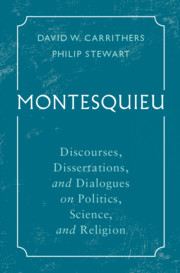Book contents
- Montesquieu
- Additional material
- Montesquieu
- Copyright page
- Contents
- Abbreviations
- A General Note on the Texts
- Introduction
- i The Uses of Science
- ii The Romans
- iii Reflections on National Character
- iv Politics and Morality
- v Statecraft
- vi Economics and Fiscal Policy
- vii Defense of The Spirit of Law (1750)
- Montesquieu Chronology
- Bibliographical Note
- Index
Introduction
Published online by Cambridge University Press: 02 November 2020
- Montesquieu
- Additional material
- Montesquieu
- Copyright page
- Contents
- Abbreviations
- A General Note on the Texts
- Introduction
- i The Uses of Science
- ii The Romans
- iii Reflections on National Character
- iv Politics and Morality
- v Statecraft
- vi Economics and Fiscal Policy
- vii Defense of The Spirit of Law (1750)
- Montesquieu Chronology
- Bibliographical Note
- Index
Summary
Few philosophes of the Enlightenment received such accolades as Charles-Louis de Secondat, Baron de Montesquieu et de la Brède (1689–1755) following publication of his Spirit of Law (1748), the product, he said, of twenty years’ study. Charles de Brosses, noted author and magistrate in Dijon, was moved to say, “What a fine work! How many ideas, what fire, what precision […], what new and luminous thoughts.” Across the Channel David Hume proclaimed Montesquieu an “author of great genius, as well as extensive learning” and concluded he had produced “the best system of political knowledge that, perhaps, has ever been communicated to the world.” Montesquieu’s work, he predicted, would be regarded as “the wonder of all centuries.” Edmund Burke was similarly awed and called Montesquieu “a genius not born in every country, or every time […] with an herculean robustness of mind.”
- Type
- Chapter
- Information
- MontesquieuDiscourses, Dissertations, and Dialogues on Politics, Science, and Religion, pp. 1 - 22Publisher: Cambridge University PressPrint publication year: 2020

